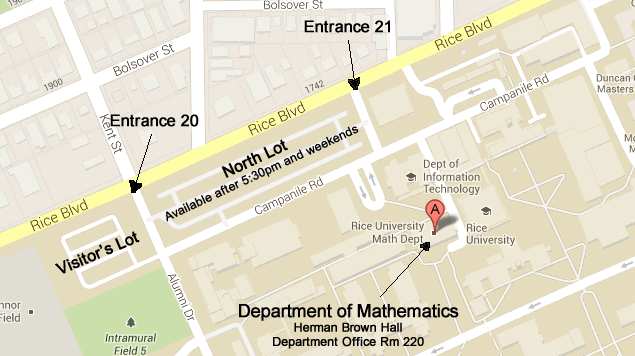Undergraduate Mathematics Degree
Mathematics lies at the foundation of many disciplines in the sciences, engineering fields, and the social sciences, and this influence is growing as these subjects become increasingly quantitative. Recognizing this important role in the wide variety of directions available to our degree recipients, the program in mathematics provides undergraduates with a spectrum of choices. These range from nontheoretical treatments of calculus and courses in combinatorics, elementary number theory, and projective geometry to a broad variety of sophisticated mathematics, including real and complex analysis, differential geometry, abstract algebra, algebraic and geometric topology, algebraic geometry, dynamics, and partial differential equations.
Degree Options
The Department of Mathematics offers two different majors -- a Bachelor of Science and a Bachelor of Arts -- as well as a math minor. We also encourage students to investigate the possibility of a double major. In conjunction with your advisor, you can design a program to allow you to meet the requirements of a math degree as well as another major such as computer science, physics or economics.
Career
Mathematics is one of the oldest and most fundamental sciences and a demanding major. Mathematicians need to have good reasoning ability in order to identify, analyze, and apply basic logical principles to technical problems. This skill can be used in a large number of professional situations, so those with a degree in mathematics are in demand for a great variety of occupations.
Take a look at the range of industries and various jobs in mathematics some of our former students have gone into.
Quick List of Resources for Students
Prospective Students
- Math Major
- Math Minor
- Advising and Transfer Credit
- Which Calculus Courses Should I Take?
- Which Courses beyond Calculus Should I Take?
- Earning course credit for Calculus prior to matriculation
Current Students
Contact Information
Tel (713) 348-4829
Mailing Address:
Rice University
Math Department -- MS 136
P.O. Box 1892
Houston, TX 77005-1892
Physical Address:
Rice University
Herman Brown Hall for Mathematical Sciences
6100 Main Street
Houston, TX 77005

